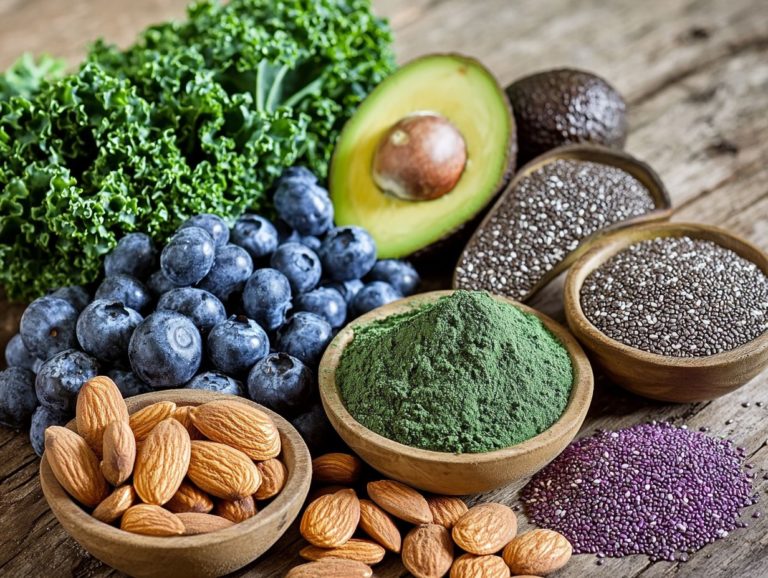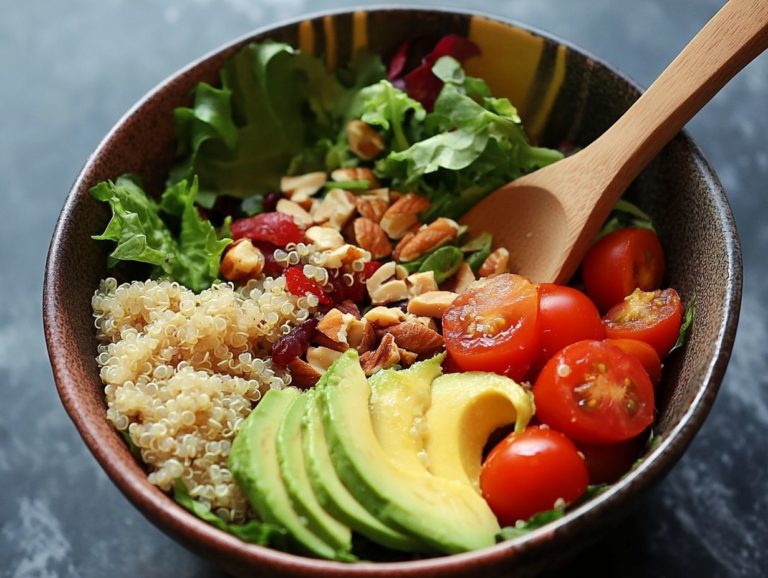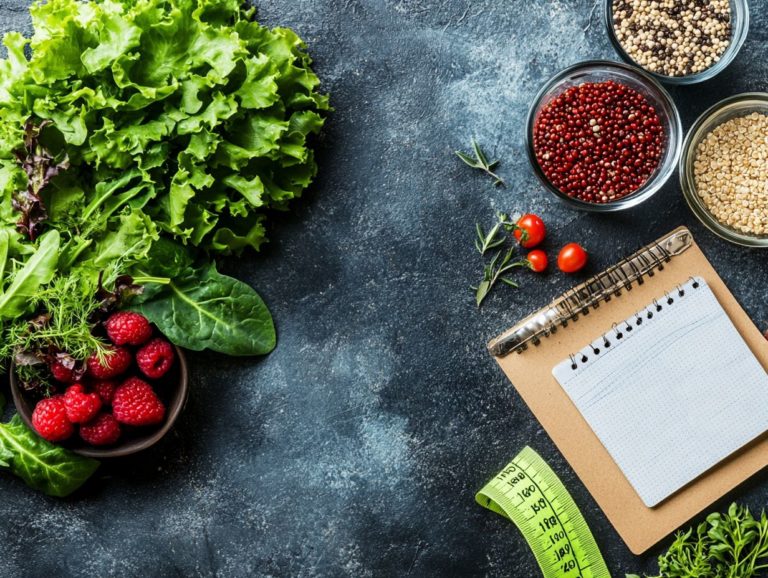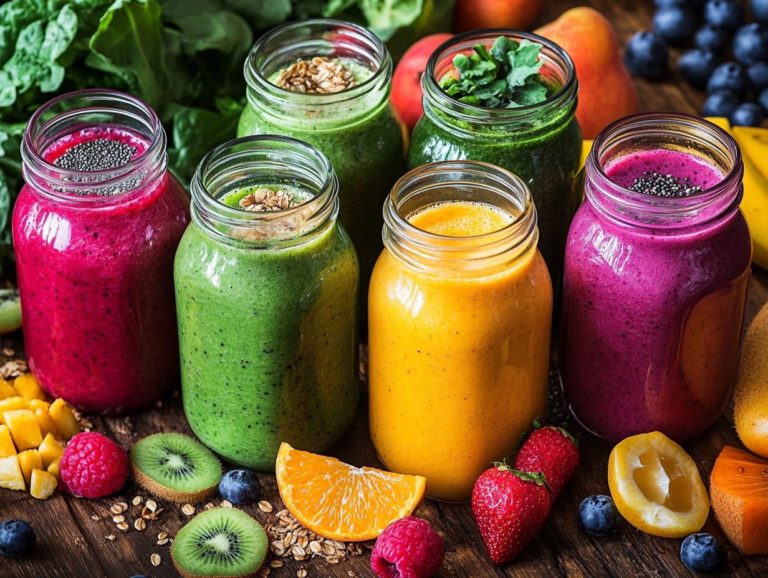Superfoods for Better Sleep: A Nutritional Approach
Are you finding it difficult to enjoy a restful night s sleep? It may be time for you to examine your diet more closely.
This article delves into the intriguing connection between nutrition and sleep quality, revealing just how much your food choices can influence your rest.
Unearth superfoods that support better sleep, discover essential nutrients that encourage relaxation, and explore meal ideas specifically designed to enhance your slumber.
Let’s explore additional lifestyle factors, such as exercise and stress management, that can guide you toward the restful nights you desire.
Dive in and uncover the secrets to rejuvenating sleep through thoughtful nutrition choices!
Contents
- Key Takeaways:
- The Link Between Nutrition and Sleep
- Superfoods for Better Sleep
- Nutrients and Compounds that Promote Sleep
- Meal and Snack Ideas for Better Sleep
- Other Lifestyle Factors for Better Sleep
- Frequently Asked Questions
- What are superfoods for better sleep?
- Why is a nutritional approach important for better sleep?
- What are some examples of superfoods for better sleep?
- Can superfoods for better sleep help with insomnia?
- Are there any negative side effects to incorporating superfoods for better sleep into my diet?
- How can I incorporate superfoods for better sleep into my daily routine?
Key Takeaways:
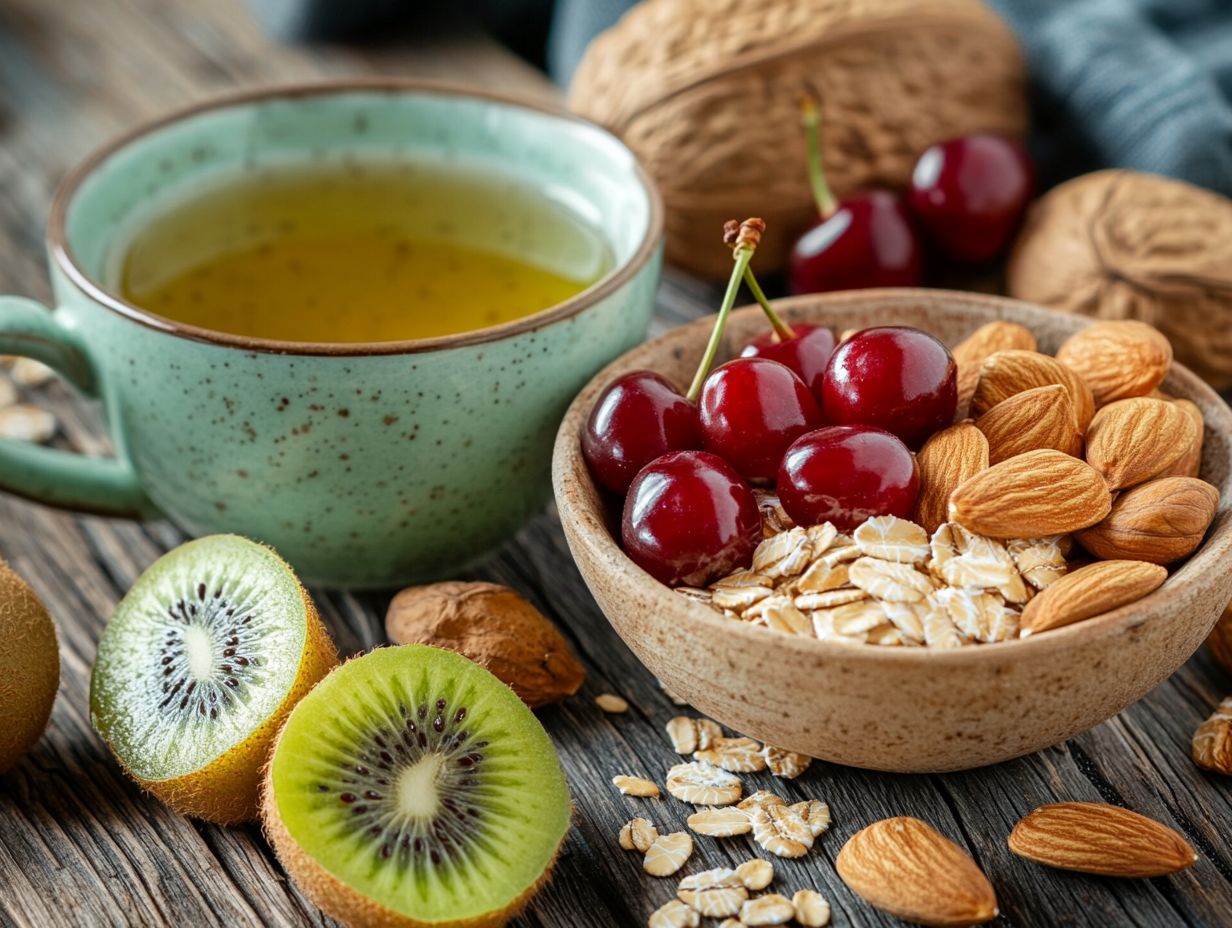
- Incorporating certain superfoods into your diet can help improve the quality of your sleep.
- Essential nutrients and compounds found in these foods, such as magnesium and tryptophan, promote better sleep by regulating hormones and neurotransmitters.
- In addition to diet, exercise, stress management, and sleep hygiene also play a crucial role in achieving better sleep.
The Link Between Nutrition and Sleep
The connection between nutrition and sleep is an important topic, especially in a society where many struggle with sleep quality, often due to subpar dietary habits and the prevalence of processed foods. Research from esteemed institutions such as Columbia University and Harvard Medical School reveals that dietary patterns have a considerable impact on sleep hygiene.
If left unaddressed, these issues can pave the way for chronic health conditions, including heart disease, diabetes, and depression. By grasping how various foods and nutritional practices influence sleep, you empower yourself to make informed choices that promote optimal gut health and overall well-being.
How Diet Affects Sleep Quality
Diet plays a crucial role in shaping your sleep quality, as certain nutrients like tryptophan and magnesium can boost melatonin production and pave the way for a restful night s sleep.
If you’re aiming to enhance your sleep patterns, understanding the connection between what you eat and how you sleep is imperative. Foods rich in tryptophan, such as turkey, nuts, and seeds, can elevate serotonin levels, which is a precursor to melatonin the hormone that helps you fall asleep.
Incorporating magnesium-laden foods like spinach, quinoa, and dark chocolate into your diet can help combat insomnia by promoting muscle relaxation and soothing the nervous system. By opting for these nutrient-dense choices, you can significantly impact the regulation of your sleep cycle, ultimately leading to a more restorative slumber.
Superfoods for Better Sleep
Incorporating superfoods into your diet can profoundly enhance your sleep quality by offering essential nutrients and compounds that encourage relaxation and deeper rest.
Consider adding Montmorency tart cherry juice, yogurt, and kiwi to your meals. These foods are abundant in compounds like serotonin and magnesium, which play a vital role in regulating your sleep cycles.
Top Foods to Incorporate into Your Diet
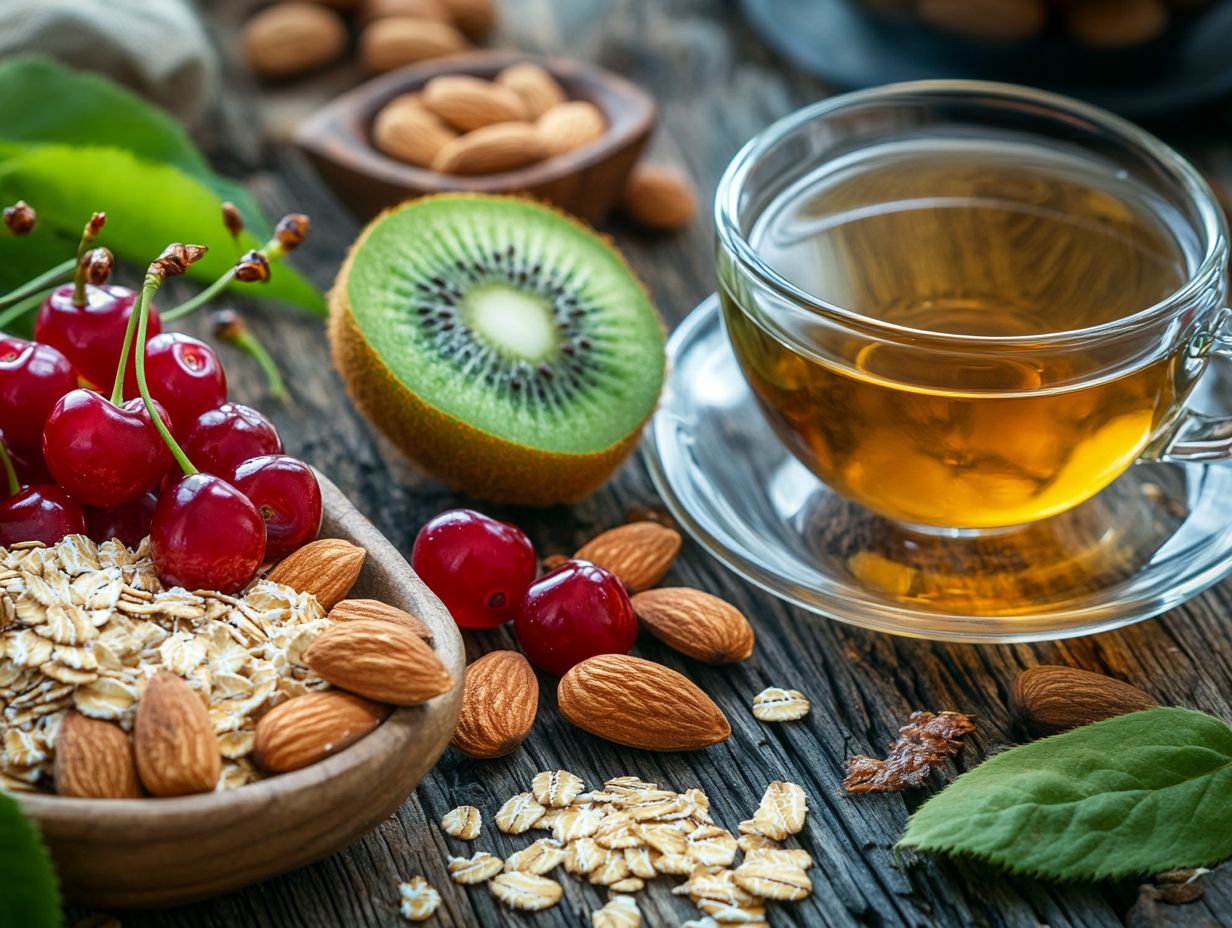
Crafting a diet that promotes better sleep involves thoughtfully incorporating specific foods rich in sleep-boosting nutrients, such as healthy carbohydrates, quality proteins, and magnesium.
Take nuts like almonds and walnuts, for example; they re not just a tasty snack they re brimming with magnesium and melatonin, which can help regulate your sleep cycles. A small handful, around one ounce, consumed in the evening can work wonders.
Similarly, fruits like cherries and bananas serve as natural sources of melatonin and potassium, making them perfect bedtime snacks. Don t forget about leafy greens spinach or kale can elevate your magnesium intake. Try adding these to your dinner salad or smoothie for an extra boost.
Strategically timing these foods is key; aim to enjoy them two to three hours before bed to maximize their effectiveness, giving your body ample time to process those nourishing nutrients.
Start making these changes today for a better night’s sleep!
Nutrients and Compounds that Promote Sleep
A variety of nutrients and compounds significantly contribute to enhancing your sleep quality. Essential vitamins, minerals, and amino acids play vital roles in this process, with tryptophan standing out as a key player.
This amino acid serves as a precursor to serotonin and melatonin, which are crucial for regulating your sleep cycle.
Essential Vitamins, Minerals, and Amino Acids
Essential vitamins and minerals, along with key amino acids, significantly influence your sleep patterns and overall quality of sleep.
For instance, magnesium is essential for managing stress levels and promoting relaxation by activating your body’s relaxation system. B vitamins especially B6, B12, and folate are important for producing neurotransmitters that help regulate mood and sleep cycles.
Amino acids like tryptophan are equally crucial as precursors to serotonin and melatonin two hormones closely linked to your sleep-wake cycle.
To ensure you re getting enough of these essential nutrients, consider adding foods like leafy greens, nuts, seeds, fish, and lean meats to your daily diet. This can significantly enhance your sleep hygiene and overall well-being.
Meal and Snack Ideas for Better Sleep
Carefully planning your meals and snacks can profoundly influence your sleep quality. It’s important to think about not only the timing of your food but also the nutritional content of what you consume before bedtime.
Making mindful choices can lead to more restful nights and rejuvenated mornings.
Recipes and Suggestions for Optimal Nutrition
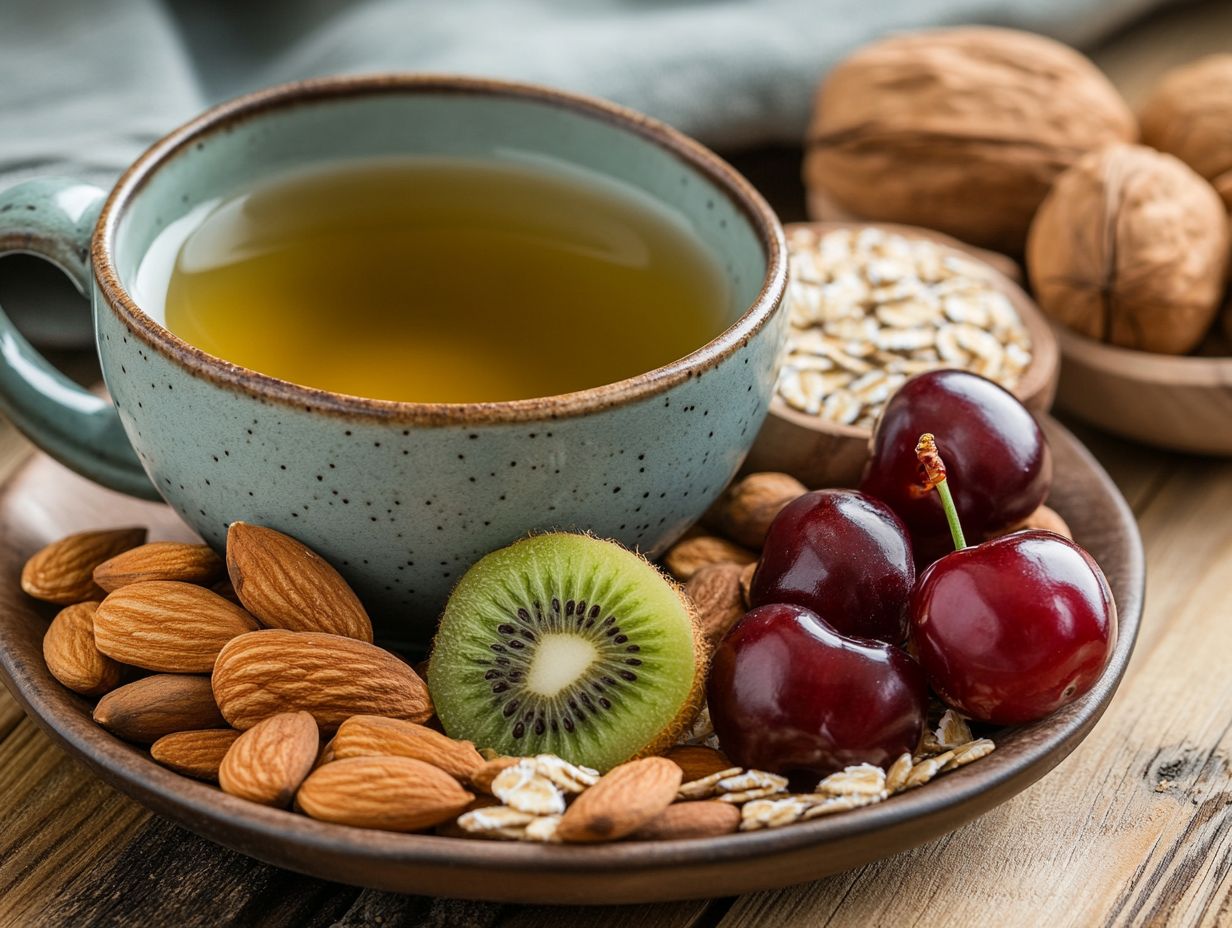
You ll love how easy and fun it is to create sleep-friendly recipes! By weaving sleep-promoting ingredients into your meals and snacks, you can craft delicious dishes.
For example, adding pumpkin seeds to your homemade granola introduces a satisfying crunch while delivering magnesium, a mineral renowned for enhancing sleep quality.
Consider whipping up a yogurt parfait with fresh berries; it’s a tasty way to combine protein and antioxidants, promoting relaxation and aiding digestion. A soothing banana smoothie, enriched with almond milk, is the perfect evening treat, as bananas are high in potassium and support muscle relaxation.
With a few simple meal prep tips, like soaking seeds overnight or prepping jars of yogurt and fruit, you can make these recipes easy to whip up and beneficial for your sleep health.
Other Lifestyle Factors for Better Sleep
Aside from nutrition, various lifestyle factors are essential for achieving better sleep. Regular exercise, effective stress management, and maintaining proper sleep hygiene are all critical components on your journey to restful nights.
Exercise, Stress Management, and Sleep Hygiene
Engaging in regular exercise, adopting effective stress management techniques, and maintaining proper sleep hygiene are crucial elements for enhancing sleep quality. When you prioritize these factors, you ll likely discover not only better rest but also an uplifted mood and improved overall well-being.
Participating in physical activities whether it s walking, yoga, or strength training can significantly impact both the duration and quality of your sleep. These activities help regulate your body’s circadian rhythm and can reduce the time it takes to fall asleep.
Practices like deep breathing, meditation, or journaling can alleviate anxiety that often disrupts restful sleep. Establishing a calming bedtime routine is key; keep your environment dark, cool, and quiet while avoiding screens and caffeine before bed to create the perfect backdrop for restorative slumber.
By integrating these strategies into your daily life, you can lay a solid foundation that promotes better sleep and a multitude of health benefits.
Frequently Asked Questions
What are superfoods for better sleep?
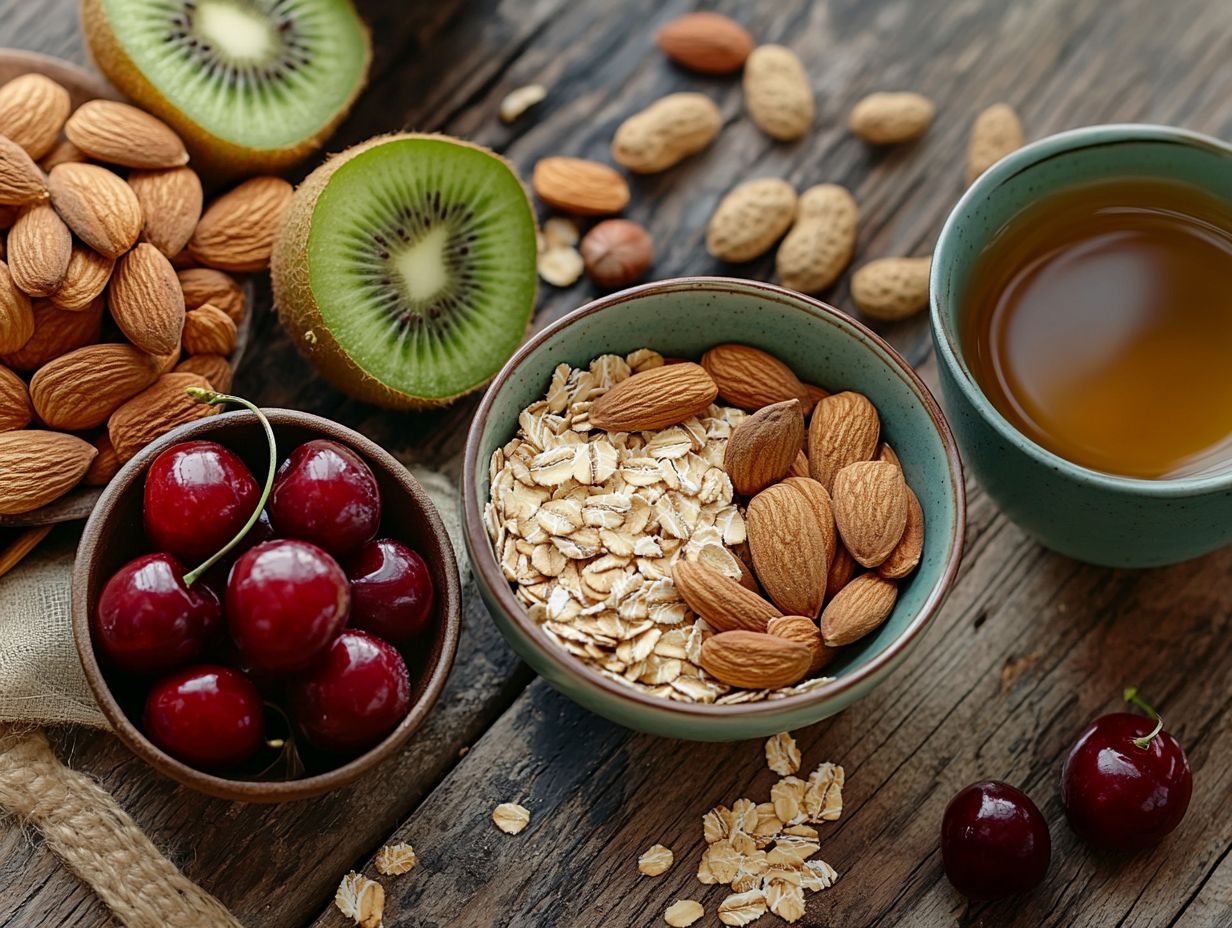
Superfoods for better sleep are nutrient-rich foods. They provide essential vitamins, minerals, and antioxidants that enhance sleep quality.
Why is a nutritional approach important for better sleep?
The foods we eat significantly impact our sleep quality. Consuming the right nutrients can regulate hormones and promote relaxation.
What are some examples of superfoods for better sleep?
Examples of superfoods for better sleep include tart cherries, walnuts, fatty fish like salmon, kiwi, and leafy greens such as spinach and kale. These foods contain melatonin, magnesium, and tryptophan, all of which aid sleep.
Can superfoods for better sleep help with insomnia?
Absolutely! Superfoods for better sleep can be a game changer for insomnia. Foods rich in melatonin, magnesium, and tryptophan can help regulate sleep cycles and promote relaxation.
Are there any negative side effects to incorporating superfoods for better sleep into my diet?
No, there are no negative side effects to incorporating superfoods for better sleep into your diet. However, it’s crucial to consult with a healthcare professional before making significant dietary changes.
How can I incorporate superfoods for better sleep into my daily routine?
Start adding superfoods for better sleep to your meals today! Try snacking on them throughout the day or blending them into a bedtime smoothie for delightful results.

